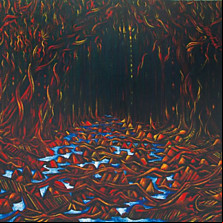BBC Review 1bj6o
An accessible return to form from the Indiana folk singer.
Jon Lusk 2009
Despite having talent to burn and a unique artistic vision, alt-torch US singer-songwriter and multi-instrumentalist Lisa Germano has had a rough ride from the music industry.
After a string of critically acclaimed but under-promoted albums during the 1990s, she withdrew into obscurity, eventually re-emerging in 2006 with In the Maybe World on Michael Gira’s Young God label. Its successor is both a more accessible record and a return to form, once again shot through with her trademark chiaroscuro of emotions.
As one of her biggest celebrity fans, Gira is also very articulate about what makes her music special. “You get the feeling you’re walking through her dreams as you listen,” he’s observed. “The intensity of feeling in her singing is a little frightening at times.”
On Magic Neighbor, Germano accompanies her conversational/confessional murmur with her own violin, piano and guitar, plus sparing and inspired use of electronic effects. The only other musicians involved are Greg Leisz, who contributes the odd twinge of pedal steel, and Sebastian Steinberg, whose acoustic bass is the most novel contribution to the lovely arrangements.
At 33 minutes, it’s almost a mini-album, but less really is more in Germano’s case.
She has a tendency to occasionally mar the prettiness of her music, such as the way unsettling percussion invades A Million Times, or the subtle use of dissonance, as on Suli-Mon, which suggests a cat skipping across her keyboard. The music box waltz of Kitty Train is the other track that reprises the feline references of her 1996 album Excerpts From a Love Circus, and one of three delicate instrumental interludes.
Painting the Doors has an abstract, watery ambience that gives away the involvement of erstwhile Eno collaborator Harold Budd. And The Prince of Plati is another key track for its existential yearning (“Oh, can’t we be happy / Just, just for today”) and a nagging melody that comes close to Snow and the closing, unresolved melancholy of Cocoon for its sheer, swooning beauty.
Given the pervading autumnal mood of Magic Neighbor, the timing of its release couldn’t be more fitting.



